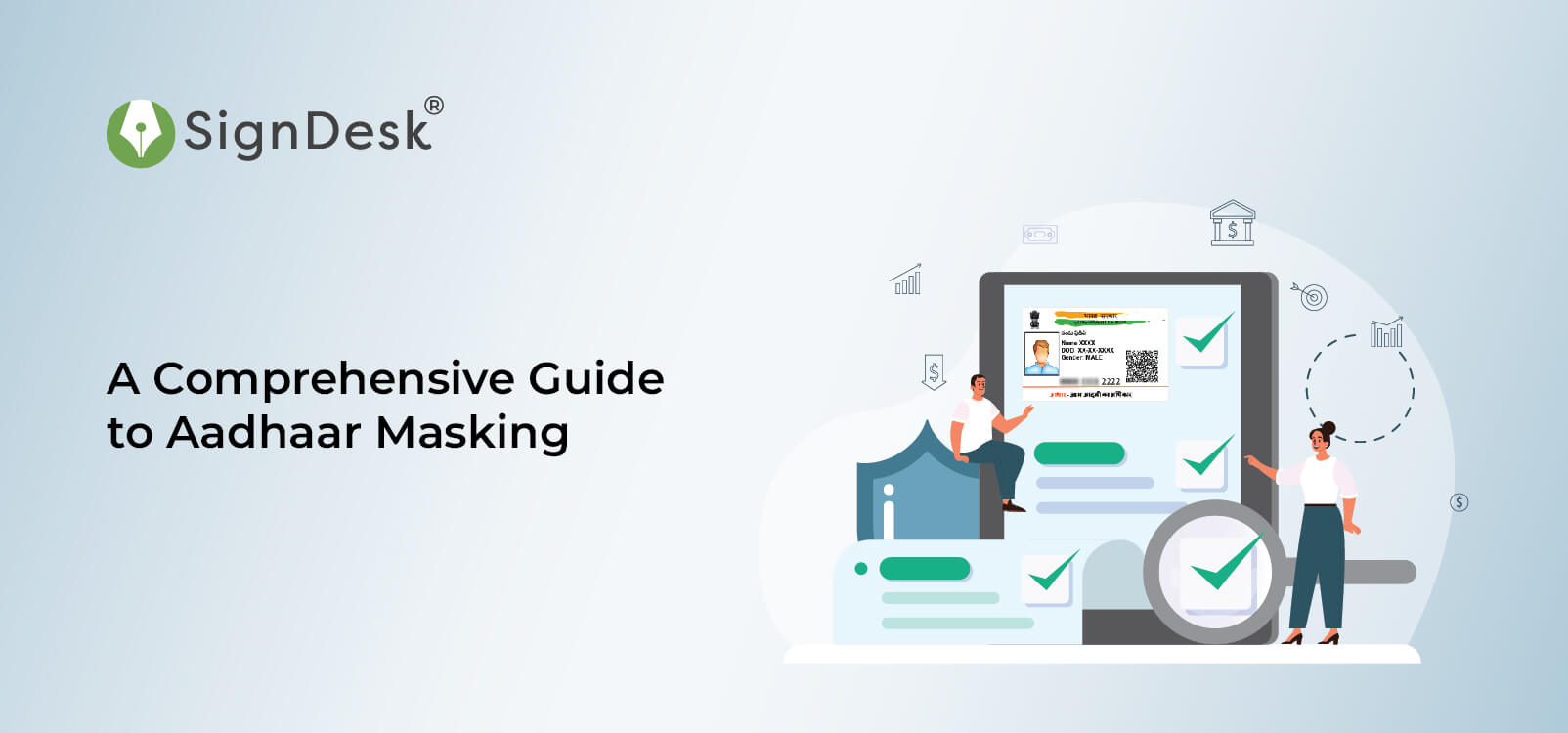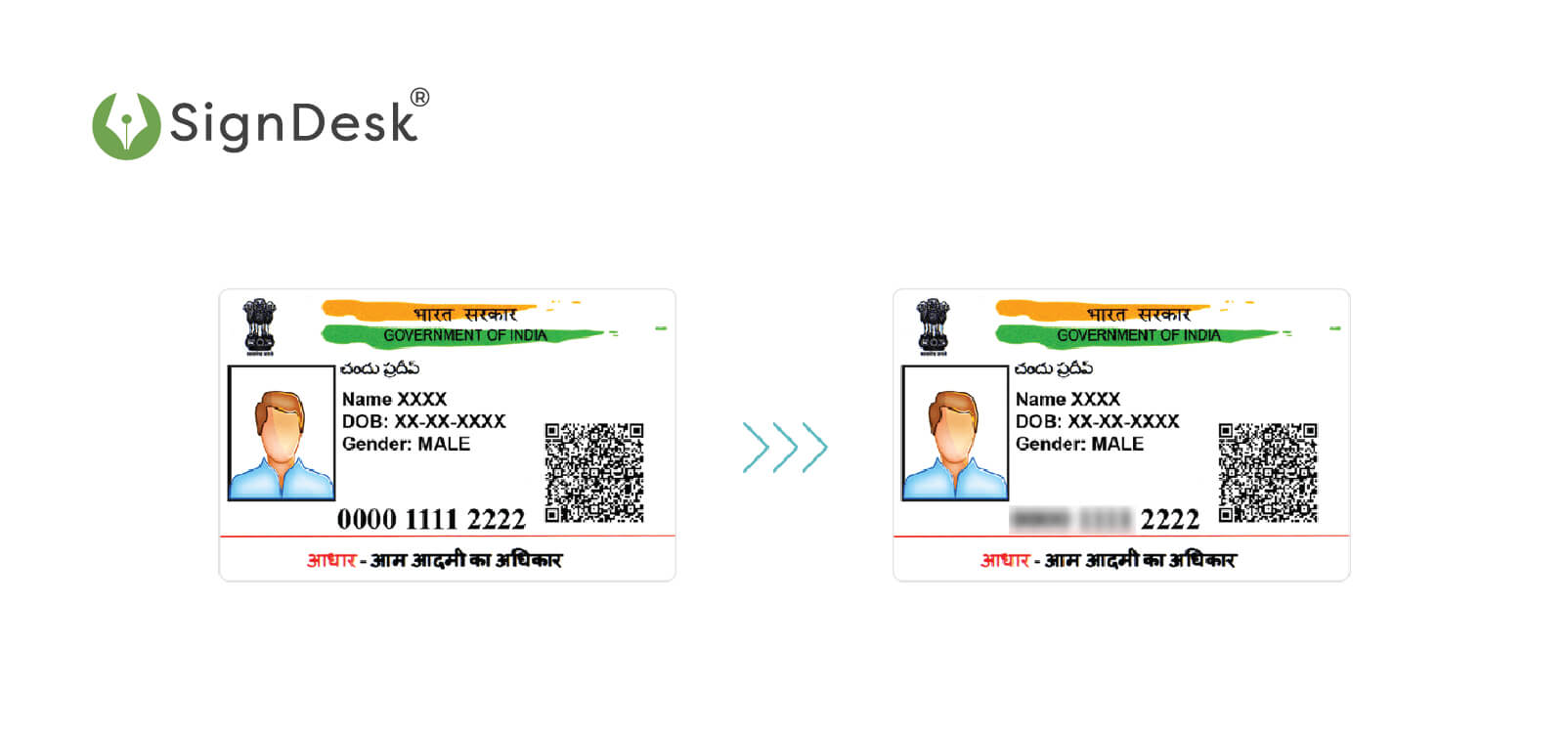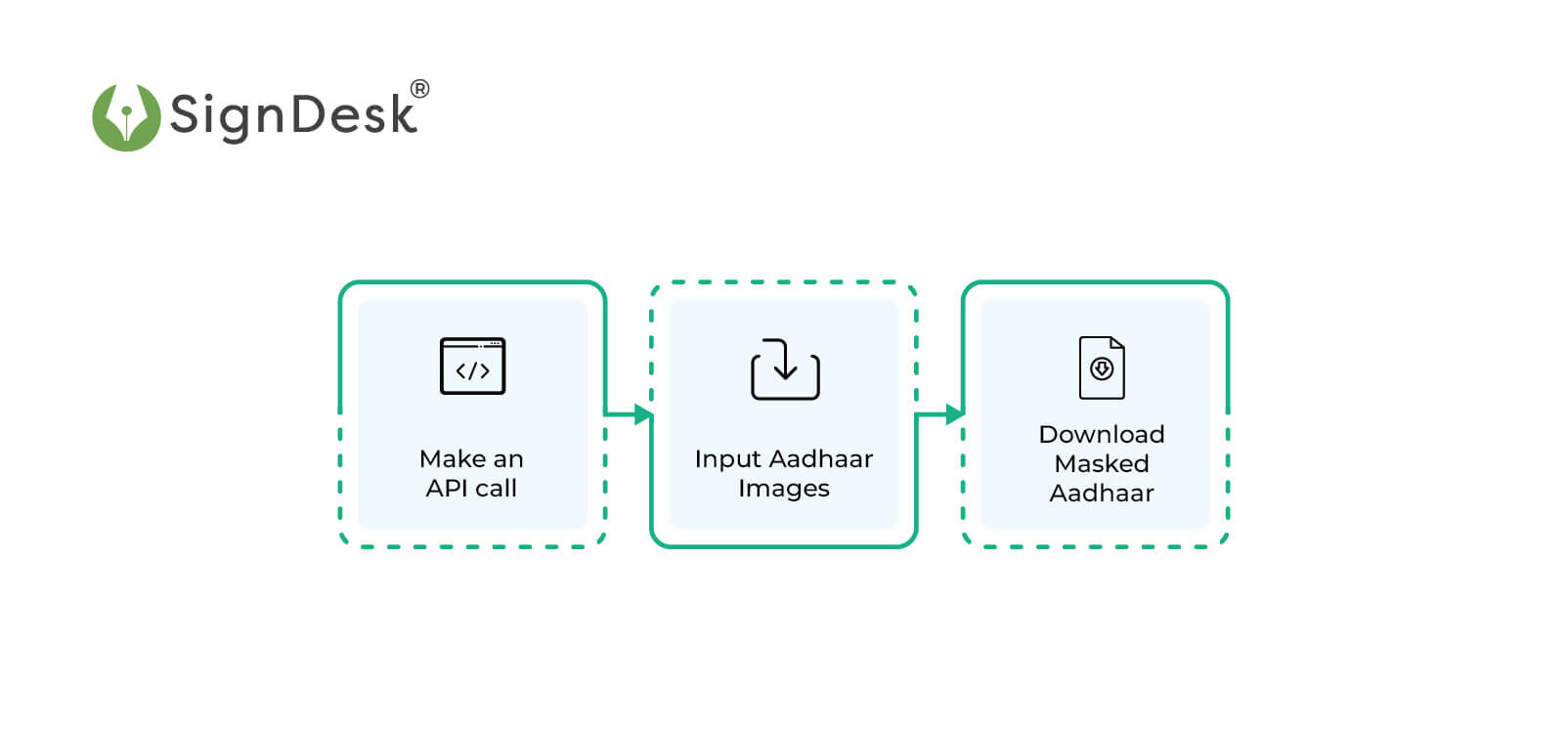Aadhaar Masking – Introduction
In the age of digital advancements and increasing concerns about privacy, the need to protect personal information has become paramount. Aadhaar, India’s unique identification system, provides demographic and biometric data and is linked with almost all government-issued IDs. However, concerns about privacy and security have led to the development of a process called “Aadhaar masking.”

Businesses must protect the privacy of customers unwilling to share their sensitive information. Software companies have come up with compliant digital solutions for Aadhaar masking. By understanding the concept of Aadhaar masking, individuals can understand the measures to protect their privacy, and businesses can provide better customer service.
What is Aadhaar Masking?
Aadhaar is a 12-digit biometric identification number issued by the Unique Identification Authority of India (UIDAI).

Aadhaar masking is a security technique used to safeguard the privacy of an individual’s Aadhaar number. It involves concealing or partially replacing certain digits of the Aadhaar number with asterisks or other characters, making it unreadable or partially visible to unauthorized individuals.
According to the official website of UIDAI, “The Mask Aadhaar option allows you to mask your Aadhaar number in your downloaded e-Aadhaar. Masked Aadhaar number implies replacing of first 8 digits of Aadhaar number with some characters like “xxxx-xxxx” while only the last 4 digits of the Aadhaar Number are visible.”
Why is Aadhaar Masking Required?
The primary purpose of Aadhaar masking is to protect individuals’ privacy and prevent misuse of their personal information. Aadhaar card contains sensitive data, including biometric details and demographic information, making it crucial to implement measures to safeguard this information. Masking Aadhaar helps individuals maintain control over their personal data while allowing for identity verification when only limited information is required.
Aadhaar Masking – Compliance & Regulatory Framework
The Ministry of Electronics & Information Technology (MeitY) issued an advisory on May 27, 2022, urging individuals to share masked copies of their Aadhaar cards instead of photocopies of original ones to enhance security and prevent misuse of personal information.
Aadhaar masking regulations mainly come under UIDAI and are followed by other regulatory entities such as RBI, IRDAI, and SEBI.
- RBI regulation on Aadhaar Masking: Master Direction – Know Your Customer (KYC) Direction, 2016 Master Direction DBR.AML.BC.No.81/14.01.001/2015-16 AND Amendment to Master Direction (MD) on KYC: RBI/2018-19/190, DBR.AML.BC.No.39/14.01.001/2018-19 state – “if a customer submits a proof of possession of Aadhaar Number containing Aadhaar Number, RI must ensure that such customer redacts or blacks out his Aadhaar number through appropriate means where the authentication of Aadhaar number is not required.”
- UIDAI regulation on Aadhaar Masking dated 23 October 2018: Ordinance Aadhaar Amendment: F.No.13012/171/2018/Legal/UIDAI/114 states that masked aadhaar is acceptable as identity proof for account opening.
- IRDAI regulation on Aadhaar Masking dated 29 January 2019: Allowing of Aadhaar Card as one of the acceptable documents for KYC- under certain conditions: Ref: IRDAI/SDD/Cl R/MISC/020/01/2019 – states that a physical copy of the Aadhaar card as well as e-Aadhaar, masked Aadhaar and offline electronic xml provided by UIDAI (if offered voluntarily by the client) can be accepted as an Officially Valid Documents for KYC purpose.
- SEBI regulation on Aadhaar Masking dated 24 April 2020: Clarification on Know Your Client (KYC) Process and Use of Technology for KYC: Ref: SEBI/HO/MIRSD/DOP/CIR/P/2020/73 – mentions “every RI shall, where the investor submits his Aadhaar number, ensure that such investor to redact or blackout his Aadhaar number through appropriate means where the authentication of Aadhaar number is not required.”
How does Aadhaar Masking Work?
The process of Aadhaar masking involves a combination of algorithms and secure data handling techniques.
- Generation of Masked Aadhaar: Individuals can obtain and download Masked Aadhaar by visiting the UIDAI website or Aadhaar Enrollment Centers. The masked version will only display the last four digits of the Aadhaar number, with the rest masked. Users can download the encrypted, masked Aadhaar card with the password.
- Authentication with Virtual ID: Individuals can generate and use a Virtual ID for Aadhaar authentication purposes to enhance security. This ensures that the actual Aadhaar number is not shared during verification.
- Aadhaar Masking API – SignDesk’s identity verification integrated Aadhaar masking API is an efficient tool for customer identity verification that ensures data privacy by masking sensitive information in an Aadhaar card. It works by concealing or replacing certain digits while allowing essential verification to protect personal data.
How To Mask Aadhaar using the Aadhaar Masking API
The Aadhaar masking API can be utilized to mask Aadhaar details during customer onboarding or KYB verification. The API enables bulk download of masked Aadhaar copies while ensuring compliance with regulations before storing them at the backend.

In such a manner, Aadhaar masking API can streamline KYC documentation and authentication, enhancing efficiency and productivity.
Here are the steps to mask Aadhaar cards using the Aadhaar masking API solution.
- Step 1. Make an API call to the Aadhaar Masking API
After integrating with the Aadhaar API, the system makes a call to the API during the KYC verification process
- Step 2. Input Aadhaar Images
Images of the front and back of the client’s Aadhaar card are sent as input. The Aadhaar API then extracts the required details from these images using OCR technology and sends the masked Aadhaar as the output.
- Step 3. Download Masked Aadhaar
A copy of the masked Aadhaar is downloaded for onboarding purposes. Multiple batches of masked Aadhaar images can also be downloaded simultaneously using the Aadhaar masking API.
Aadhaar Masking Features – How Aadhaar APIs Enhance Security
Aadhaar Masking offers features to enhance security and safeguard the confidentiality of personal information associated with Aadhaar identification.
- Real-time Masking: Aadhaar masking reveals only the last four digits of the Aadhaar number, while the rest are replaced with “x” or asterisks (*). This partial disclosure ensures that sensitive information remains hidden, providing anonymity and enhancing privacy protection in real-time masking & authentication.
- Bulk Masking: Bulk Aadhaar masking involves automating the process of masking Aadhaar numbers in large quantities and verifying Aadhaar records simultaneously in multiple KYC workflows.
- QR Code: Aadhaar cards include a QR code containing encrypted information. It provides necessary details while keeping the Aadhaar number hidden when scanned. This helps ensure secure and accurate data transmission during authentication processes.
- Virtual ID (VID): Users can generate a Virtual ID, a temporary revocable 16-digit number, as an alternative to their Aadhaar number. It acts as a proxy and can be used for authentication purposes instead of the actual Aadhaar number for various transactions, safeguarding the individual’s privacy.
- Quick Integration: API platforms are easy to implement with the existing business systems and aadhaar masking API can be integrated to streamline masking automation. API platforms are secure gateways that businesses can easily integrate to expedite their workflows.
These masking features aim to balance privacy protection and the efficient utilization of Aadhaar for authentication purposes, ensuring data security and reducing the potential for identity theft or fraud.
Aadhaar Masking API for Efficiency & Risk Mitigation
Businesses need to implement security measures to offer a safe digital environment to their customers and ease their way of business.
Masking Aadhaar details during the KYC verification process not only enhances data protection and compliance with regulatory requirements but also provides an improved customer experience.
- Scalability – Using Aadhaar masking API, businesses can upload KYC documents and verify in bulk, enabling businesses to efficiently process a large volume of Aadhaar numbers promoting scalability and streamlined operations.
- Enhanced Data Privacy – Masking the first eight digits of Aadhaar numbers helps protect sensitive personal information and enhances data privacy by limiting exposure.
- Improved Customer Trust – Implementing Aadhaar masking demonstrates a commitment to data privacy and security, fostering trust among customers and stakeholders and enhancing the organization’s overall reputation.
- Limited Biometric Sharing – Aadhaar authentication mechanisms allow limited biometric information sharing to enhance privacy. Instead of providing full fingerprint or iris data, a hash or encrypted representation is used to verify identity, minimizing the risk of data misuse.
- Regulatory Compliance – The API ensures compliance with regulatory requirements, such as those set by UIDAI and other governing bodies, by automatically masking Aadhaar numbers as mandated. By using the Aadhaar masking API, businesses can ensure compliance with regulations that mandate the masking of Aadhaar numbers once the KYC process is completed.
- Reduced Fraud Risk – Masking Aadhaar numbers reduces the risk of identity theft and fraud, as sensitive information is concealed, making it harder for malicious fraudsters to misuse the data. Users can choose to protect their information and businesses can maintain data privacy.
- Seamless User Experience – Users can undergo the necessary KYC processes by opting for convenient digital masking instead of manually masking their Aadhaar numbers. This leads to a smoother and more secure experience during customer onboarding or verification procedures.
Enhance Onboarding Integrity with SignDesk’s Aadhaar Masking API
SignDesk is a digital solution provider offering API-based KYC verification solutions. Our Aadhaar masking API helps verify legitimate customer identity while addressing concerns related to misuse of sensitive demographic & biometric data, unauthorized access, data breaches, and identity theft by masking Aadhaar details during the verification process.
By embracing Aadhaar masking, businesses can harness the potential of digital onboarding while preserving the privacy and security of Aadhaar data.
Whether it’s the seamless Aadhaar e-sign, Udyog Aadhaar verification, or the reliable Aadhaar verification for onboarding workflows, SignDesk’s suite of digital solutions empowers you with secure, efficient, and compliant processes.
With SignDesk’s Aadhaar-based solutions, you can embrace the future of digital transactions and verifications. Simplify your procedures, improve security, and assure regulatory compliance, all at your fingertips.
Integrate our Aadhaar masking API into your KYC verification workflow to stay compliant and enhance security.